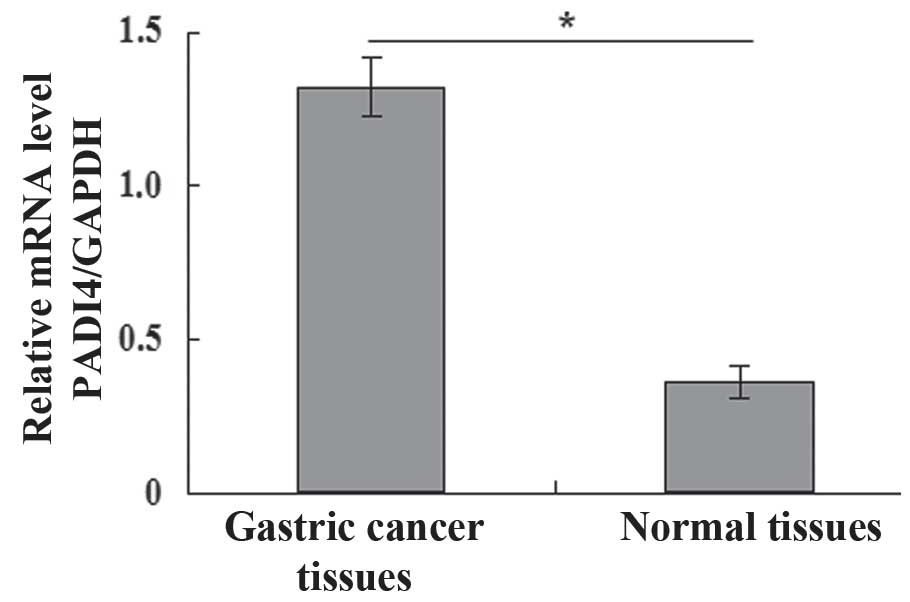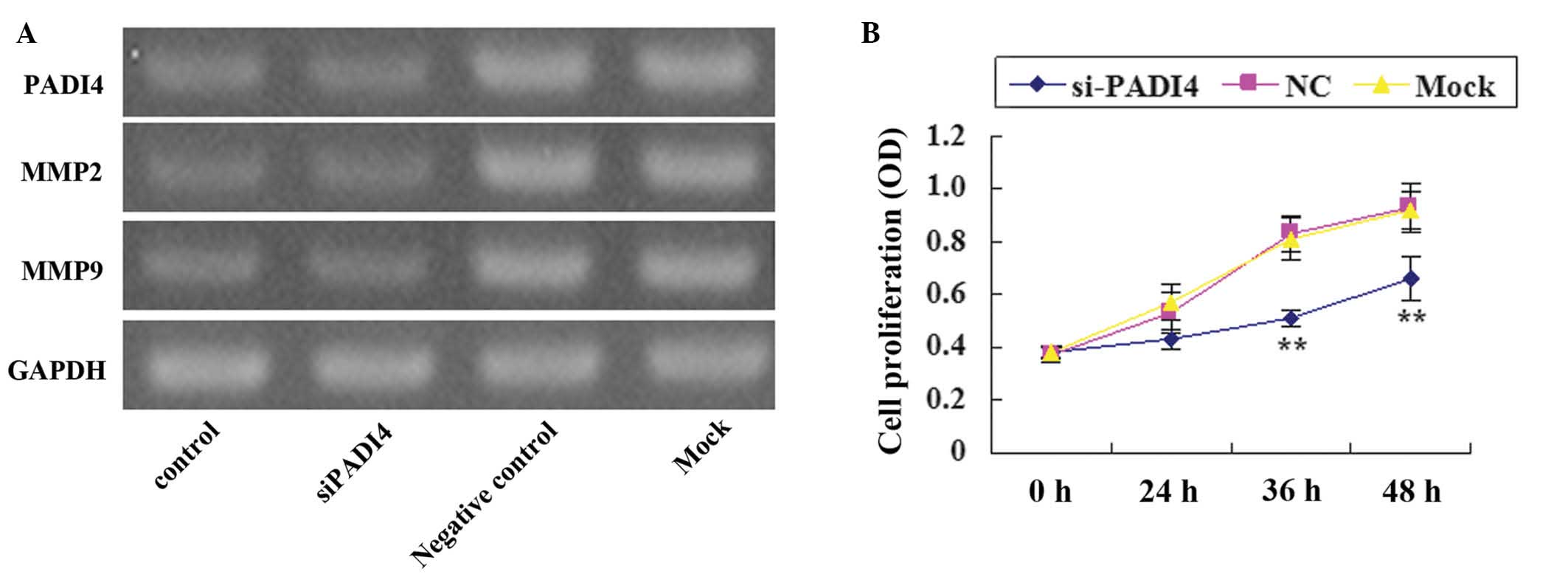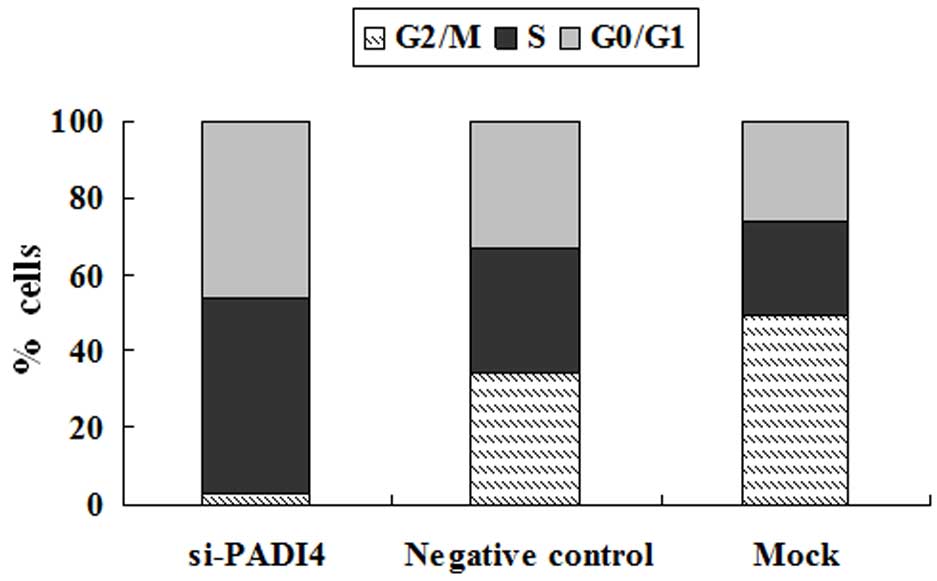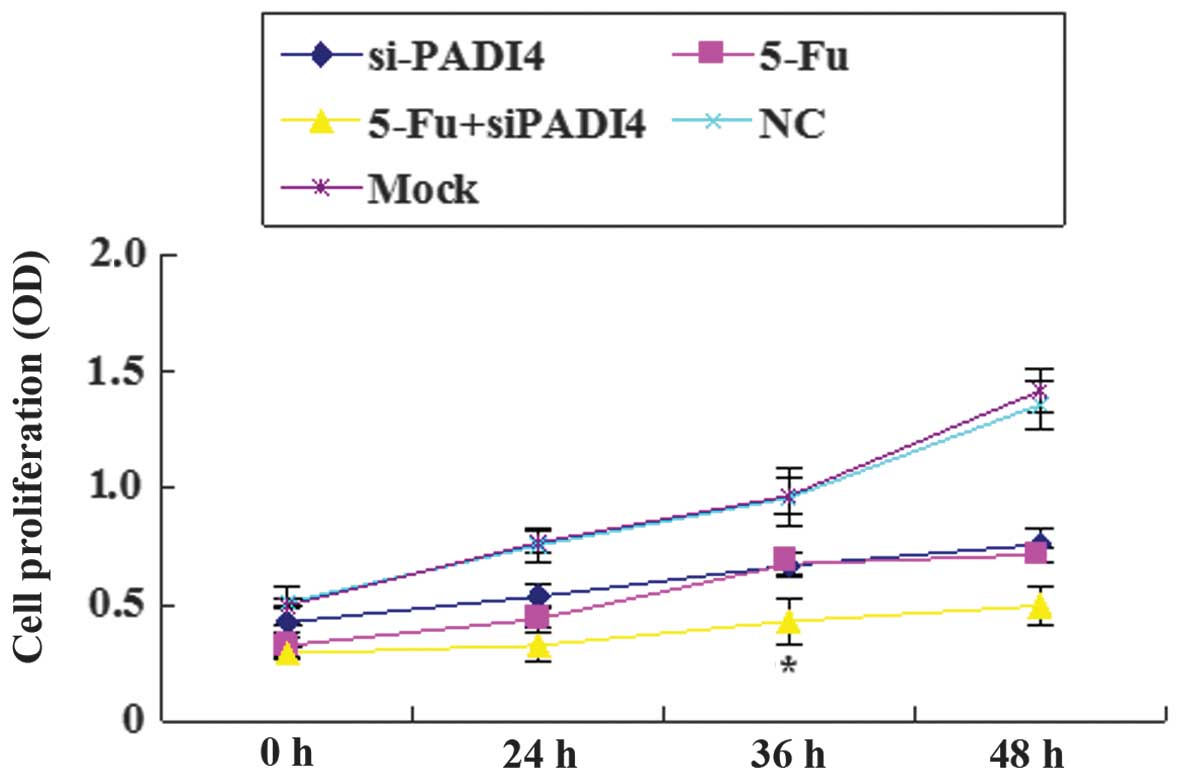|
1
|
Roder DM: The epidemiology of gastric
cancer. Gastric Cancer. 5(Suppl 1): 5–11. 2002. View Article : Google Scholar : PubMed/NCBI
|
|
2
|
Parkin DM, Bray FI and Devesa SS: Cancer
burden in the year 2000. The global picture. Eur J Cancer. 37(Suppl
1): S4–S66. 2001. View Article : Google Scholar
|
|
3
|
Tahara E: Molecular aspects of invasion
and metastasis of stomach cancer. Verh Dtsch Ges Pathol. 84:43–49.
2000.PubMed/NCBI
|
|
4
|
Sud R, Wells D, Talbot IC and Delhanty JD:
Genetic alterations in gastric cancers from British patients.
Cancer Genet Cytogenet. 126:111–119. 2001. View Article : Google Scholar : PubMed/NCBI
|
|
5
|
Fiocca R, Luinetti O, Villani L, Mastracci
L, Quilici P, Grillo F and Ranzani GN: Molecular mechanisms
involved in the pathogenesis of gastric carcinoma: Interactions
between genetic alterations, cellular phenotype and cancer
histotype. Hepatogastroenterology. 48:1523–1530. 2001.PubMed/NCBI
|
|
6
|
El-Rifai W and Powell SM: Molecular
biology of gastric cancer. Semin Radiat Oncol. 12:128–140. 2002.
View Article : Google Scholar : PubMed/NCBI
|
|
7
|
Wang L, Wei D, Huang S, Peng Z, Le X, Wu
TT, Yao J, Ajani J and Xie K: Transcription factor Sp1 expression
is a significant predictor of survival in human gastric cancer.
Clin Cancer Res. 9:6371–6380. 2003.PubMed/NCBI
|
|
8
|
Kurayoshi M, Oue N, Yamamoto H, Kishida M,
Inoue A, Asahara T, Yasui W and Kikuchi A: Expression of Wnt-5a is
correlated with aggressiveness of gastric cancer by stimulating
cell migration and invasion. Cancer Res. 66:10439–10448. 2006.
View Article : Google Scholar : PubMed/NCBI
|
|
9
|
Wei D, Gong W, Kanai M, Schlunk C, Wang L,
Yao JC, Wu TT, Huang S and Xie K: Drastic down-regulation of
Krüppel-like factor 4 expression is critical in human gastric
cancer development and progression. Cancer Res. 65:2746–2754. 2005.
View Article : Google Scholar : PubMed/NCBI
|
|
10
|
Liu YL, Chiang YH, Liu GY and Hung HC:
Functional role of dimerization of human peptidylarginine deiminase
4 (PAD4). PLoS One. 6:e213142011. View Article : Google Scholar : PubMed/NCBI
|
|
11
|
Chang X and Han J: Expression of
peptidylarginine deiminase type 4 (PAD4) in various tumors. Mol
Carcinog. 45:183–196. 2006. View
Article : Google Scholar : PubMed/NCBI
|
|
12
|
Chang X, Han J, Pang L, Zhao Y, Yang Y and
Shen Z: Increased PADI4 expression in blood and tissues of patients
with malignant tumors. BMC Cancer. 9:402009. View Article : Google Scholar : PubMed/NCBI
|
|
13
|
Wang L, Chang X, Yuan G, Zhao Y and Wang
P: Expression of peptidylarginine deiminase type 4 in ovarian
tumors. Int J Biol Sciences. 6:454–464. 2010. View Article : Google Scholar
|
|
14
|
Ordóñez A, Yélamos J, Pedersen S, Miñano
A, Conesa-Zamora P, Kristensen SR, Stender MT, Thorlacius-Ussing O,
Martínez-Martínez I, Vicente V and Corral J: Increased levels of
citrullinated antithrombin in plasma of patients with rheumatoid
arthritis and colorectal adenocarcinoma determined by a newly
developed ELISA using a specific monoclonal antibody. Thromb
Haemost. 104:1143–1149. 2010. View Article : Google Scholar : PubMed/NCBI
|
|
15
|
Simms D, Cizdziel PE and Chomczynski P:
TRIzol: A new reagent for optimal single-step isolation of RNA.
Focus. 15:532–535. 1993.
|
|
16
|
Livak KJ and Schmittgen TD: Analysis of
relative gene expression data using real-time quantitative PCR and
the 2−ΔΔCT method. Methods. 25:402–408. 2001. View Article : Google Scholar : PubMed/NCBI
|
|
17
|
Tiffen JC, Bailey CG, Ng C, Rasko JE and
Holst J: Luciferase expression and bioluminescence does not affect
tumor cell growth in vitro or in vivo. Mol Cancer. 9:2992010.
View Article : Google Scholar : PubMed/NCBI
|
|
18
|
Haase SB and Reed SI: Improved flow
cytometric analysis of the budding yeast cell cycle. Cell Cycle.
1:132–136. 2002. View Article : Google Scholar : PubMed/NCBI
|
|
19
|
Katz M, Amit I, Citri A, Shay T, Carvalho
S, Lavi S, Milanezi F, Lyass L, Amariglio N, Jacob-Hirsch J, et al:
A reciprocal tensin-3-cten switch mediates EGF-driven mammary cell
migration. Nat Cell Biol. 9:961–969. 2007. View Article : Google Scholar : PubMed/NCBI
|
|
20
|
Wang Y, Wysocka J, Sayegh J, Lee YH,
Perlin JR, Leonelli L, Sonbuchner LS, McDonald CH, Cook RG, Dou Y,
et al: Human PAD4 regulates histone arginine methylation levels via
demethylimination. Science. 306:279–283. 2004. View Article : Google Scholar : PubMed/NCBI
|
|
21
|
Klose RJ and Zhang Y: Regulation of
histone methylation by demethylimination and demethylation. Nat Rev
Mol Cell Biol. 8:307–318. 2007. View
Article : Google Scholar : PubMed/NCBI
|
|
22
|
Cuthbert GL, Daujat S, Snowden AW,
Erdjument-Bromage H, Hagiwara T, Yamada M, Schneider R, Gregory PD,
Tempst P, Bannister AJ and Kouzarides T: Histone deimination
antagonizes arginine methylation. Cell. 118:545–553. 2004.
View Article : Google Scholar : PubMed/NCBI
|
|
23
|
Suzuki A, Yamada R, Chang X, Tokuhiro S,
Sawada T, Suzuki M, Nagasaki M, Nakayama-Hamada M, Kawaida R, Ono
M, et al: Functional haplotypes of PADI4, encoding citrullinating
enzyme peptidylarginine deiminase 4, are associated with rheumatoid
arthritis. Nat Genet. 34:395–402. 2003. View Article : Google Scholar : PubMed/NCBI
|
|
24
|
Chang X, Zhao Y, Sun S, Zhang Y and Zhu Y:
The expression of PADI4 in synovium of rheumatoid arthritis.
Rheumatol Int. 29:1411–1416. 2009. View Article : Google Scholar : PubMed/NCBI
|
|
25
|
Iwamoto T, Ikari K, Nakamura T, Kuwahara
M, Toyama Y, Tomatsu T, Momohara S and Kamatani N: Association
between PADI4 and rheumatoid arthritis: A meta-analysis.
Rheumatology (Oxford). 45:804–807. 2006. View Article : Google Scholar : PubMed/NCBI
|
|
26
|
Lv Y, Xia Y, Wang Y and Cai C: Expression
of PADI4 in hepatocellular carcinoma. Chinese-German J Clin Oncol.
8:453–455. 2009. View Article : Google Scholar
|
|
27
|
Ulivi P, Mercatali L, Casoni GL, Scarpi E,
Bucchi L, Silvestrini R, Sanna S, Monteverde M, Amadori D, Poletti
V and Zoli W: Multiple marker detection in peripheral blood for
NSCLC diagnosis. PLoS One. 8:e574012013. View Article : Google Scholar : PubMed/NCBI
|
|
28
|
Kessenbrock K, Plaks V and Werb Z: Matrix
metalloproteinases: Regulators of the tumor microenvironment. Cell.
141:52–67. 2010. View Article : Google Scholar : PubMed/NCBI
|
|
29
|
Bauvois B: New facets of matrix
metalloproteinases MMP-2 and MMP-9 as cell surface transducers:
Outside-in signaling and relationship to tumor progression. Biochim
Biophys Acta. 1825:29–36. 2012.PubMed/NCBI
|
|
30
|
Roy R, Yang J and Moses MA: Matrix
metalloproteinases as novel biomarkers and potential therapeutic
targets in human cancer. J Clin Oncol. 27:5287–5297. 2009.
View Article : Google Scholar : PubMed/NCBI
|
|
31
|
Turpeenniemi-Hujanen T: Gelatinases (MMP-2
and −9) and their natural inhibitors as prognostic indicators in
solid cancers. Biochimie. 87:287–297. 2005. View Article : Google Scholar : PubMed/NCBI
|
|
32
|
Wong TS, Kwong DL, Sham JS, Wei WI, Kwong
YL and Yuen AP: Clinicopathologic significance of plasma matrix
metalloproteinase-2 and −9 levels in patients with undifferentiated
nasopharyngeal carcinoma. Eur J Surg Oncol. 30:560–564. 2004.
View Article : Google Scholar : PubMed/NCBI
|
|
33
|
Matsumura S, Oue N, Nakayama H, Kitadai Y,
Yoshida K, Yamaguchi Y, Imai K, Nakachi K, Matsusaki K, Chayama K
and Yasui W: A single nucleotide polymorphism in the MMP-9 promoter
affects tumor progression and invasive phenotype of gastric cancer.
J Cancer Res Clin Oncol. 131:19–25. 2005. View Article : Google Scholar : PubMed/NCBI
|
|
34
|
Liu GY, Liao YF, Chang WH, Liu CC, Hsieh
MC, Hsu PC, Tsay GJ and Hung HC: Overexpression of peptidylarginine
deiminase IV features in apoptosis of haematopoietic cells.
Apoptosis. 11:183–196. 2006. View Article : Google Scholar : PubMed/NCBI
|
|
35
|
Li P, Yao H, Zhang Z, Li M, Luo Y,
Thompson PR, Gilmour DS and Wang Y: Regulation of p53 target gene
expression by peptidylarginine deiminase 4. Mol Cell Biol.
28:4745–4758. 2008. View Article : Google Scholar : PubMed/NCBI
|
|
36
|
Yao H, Li P, Venters BJ, Zheng S, Thompson
PR, Pugh BF and Wang Y: Histone Arg modifications and p53 regulate
the expression of OKL38, a mediator of apoptosis. J Biol Chem.
283:20060–20068. 2008. View Article : Google Scholar : PubMed/NCBI
|



















